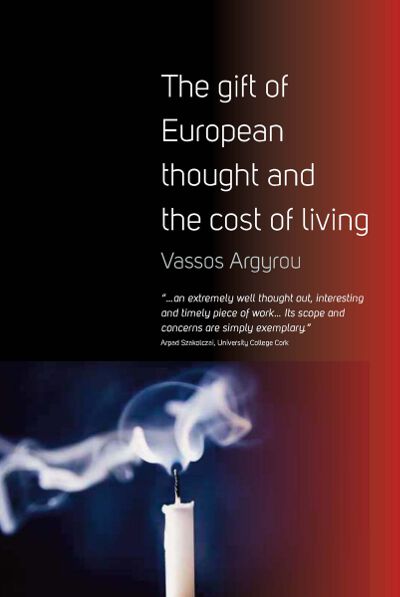Is the spread of Western, specifically European, thought truly a gift to the rest of the world, or is this dissemination simply a way of exerting cultural power? Vassos Argyrou seeks an answer to this question in his newly released volume The Gift of European Thought and the Cost of Living. Below, the author explains his inspiration for—and the challenges and rewards of—writing the book, published September 2013.
_________________________________________

Berghahn Books: What drew you to the study of “European Thought” and what are some examples of this?
Vassos Argyrou: “European thought” is a term that in a certain sense was imposed on me as it was used to make the highly contentious claim that it’s a gift to the rest of the world. It refers not only to an intellectual tradition but also to a way of life or culture—European or, more broadly, Western culture.
It is this claim that got me interested, as it clashes with everything we know. If European thought is a gift, how is one to explain the symbolic violence it exerts on the rest of the world? And why do those who claim it’s a gift—postcolonial scholars in this case—wish to “provincialize” it? The most fundamental aspect of this culture is the idea that the subject thinks for itself and in this way constitutes itself as an autonomous being. Is this possible? This is the key question raised in the book.
BB: Did any perceptions on the subject change from the time you started your research to the time you completed the book?
VA: Not the main argument per se, but writing a book is like embarking on an adventure. Although you have a broad idea where you are going, you can’t be sure that you’ll get there. Nor can you know in advance what you’ll find along the way. To anticipate the next question, this is what makes it such a rewarding undertaking, the things that you don’t know about and discover as you go along.
BB: What aspect of writing this work did you find most challenging? Most rewarding?
VA: The most challenging part of the book was to explain why revolution is what the term itself says about itself—revolving, going back to the point of departure—not what we mean by it today—going forward, creating a new society. This, I think, shows how far we are all caught in our culture and how difficult it is to question things that one takes for granted. Figuring out this problem was one of the most rewarding things about the book.
BB: To what extent do you think the book will contribute to debates among current and future academics within the field?
VA: The book is interdisciplinary, but one of the things it does is to show how anthropology could be used to further our understanding of the societies in which it originated. It also raises questions about the status of postcolonial criticism (what sort of critique is it, and what are its limits?); the nature of modernity, particularly in the context of so-called “reflexive” or “second” modernization; and questions on poststructuralism and its place within the broader Western intellectual tradition.
BB: Do you think there are aspects of this work that will be controversial to other scholars working in the field?
VA: The book questions some of the most fundamental and cherished assumptions of European thought. It shows that a range of firmly entrenched oppositions are no oppositions at all, that the terms are complementary and reversible as there is nothing between them. This is not a new idea, of course, but I like to think that I’m using it to explore new areas. The book argues, for example, that thinking for oneself is the same as taking for granted, resistance the same as conformity, modernity the same as tradition. I suspect that scholars attached to the first (and dominant) term of each of these oppositions will find it controversial.
BB: If you weren’t an anthropologist, what would you have done instead?
VA: Once I was toying with the idea of becoming a philosopher, but I was put off by Anglo-American analytical philosophy. If I weren’t an anthropologist I would probably continue doing what I’m doing now—but not call myself an anthropologist!
BB: What inspired you to research and write?
VA: A friend says that we all have itches to scratch. I think this is a pretty accurate description of what ‘inspires’ me—if that’s the right term to use here—to research and write.
BB: Who is one iconic figure featured in one way or another in your field of research, living or dead, for whom you have particular admiration and why?
VA: Jacques Derrida would be the icon if I wasn’t an iconoclast. But seriously, I admire his work immensely and have learned much from it, even though it is not always easy to digest. Much of what Derrida says has been said before, of course, and I think he would agree that there is nothing new under the sun. What is significant is what he does with what has been said before. For example, the idea that there may not be such thing as time is very old. It appears in Aristotle and was discussed extensively by St Augustine. Derrida gives it new life. With him, it is not simply a scholastic paradox, but a new way of looking at the world, which has profound consequences.
_________________________________________________
Vassos Argyrou is Reader in Social Anthropology in the Department of Social Sciences, University of Hull. His publications include Tradition and Modernity in the Mediterranean: The Wedding as Symbolic Struggle (Cambridge University Press, 1996), Anthropology and the Will to Meaning: A Postcolonial Critique (Pluto Press, 2002), and The Logic of Environmentalism: Anthropology, Ecology and Postcoloniality (Berghahn Books, 2005).
